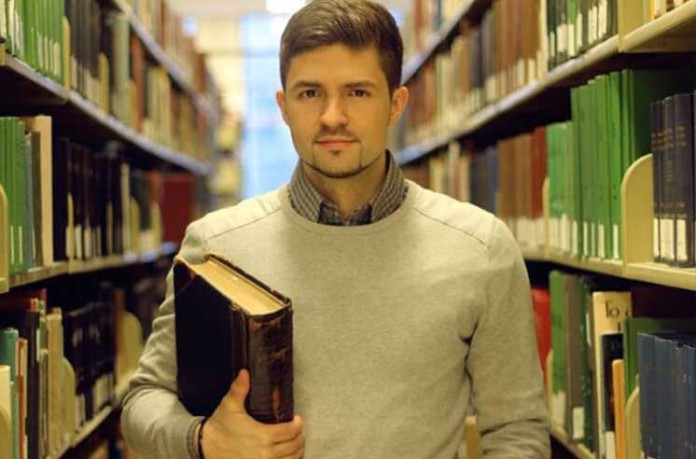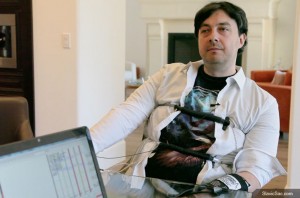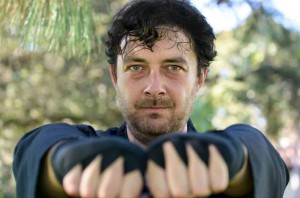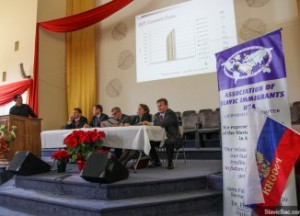Quite often we hear testimonies of how people come from unbelief to faith and from atheism to belief in God. However, in the last several years I noticed the opposite tendency taking place in Slavic Evangelical churches in North America. Youth and young adults are leaving churches and actually making a journey from faith in Christ to atheism. Yuriy Stasyuk has a Slavic background. He comes from a devout Christian family with a long line of ministers. He immigrated to the United States from the former USSR together with his parents. Yuri received his education in the United States. Through this interview, I wanted to find out why Yuri is now an atheist and what was his journey from faith to atheism like.
Читать текст на русском языке
Yuriy, thank you so much for agreeing to talk and discuss issues of faith and atheism and your personal journey from faith in God to unbelief. First, tell me a bit about your background. Tell me about your family and childhood. How did it happen that you and your family ended up in the United States?
Oleg, first off I would like to express my gratitude for the opportunity to participate in this dialogue. My hope is that it will serve as a productive and insightful discourse for both of us, as well as the readers. Now, onto my background: I was born in Ukraine, into an devout Evangelical family with deep roots into Slavic Christianity. Both of my grandfathers were ministers. This mantle was passed to my father and his brother, who are also pastors. While we lived in the Ukraine, my father was an itinerant evangelist and director of evangelism at the largest association of Protestants in Ukraine. This often led him to leave our family for weeks at a time as he traveled on evangelistic trips, though sometimes, I would join him on local preaching trips. So, even as a child, I was already involved in missionary work. Eventually, when I was seven we moved to the United States to seek better life and enable my dad to minister at a local church and spend more time with his family.
How did you come to Christ? Which church and denomination did you join? Do you remember that day? What did your conversion mean to you back then? Did you embrace Christian faith willingly and consciously or was it more like passing of the torch from your parents? Was Christian faith an entirely new and life-changing path for you?
I had quite a tumultuous journey. I spent my childhood and teenage years being a reluctant Christian. I wanted to be moral enough to make it to heaven without having to give up my worldly affections (sports, television, reading novels, playing video games). At the age of 17, I was baptized at my Slavic Evangelical Pentecostal church and, while I sincerely believed in the existence of God, the veracity of the Bible, and the deity of Jesus, I wasn’t very devoted to my faith and continued living with one foot in the world. I was frequently told that I would become a preacher, but I hated that idea and wanted nothing to do with church or ministry.
Yet, at the age of 18, during a severe bout of the flu, I began to seek God more intimately. I still remember that moment, I was laying in my bed, wishing to be healed, so I decided to search the Scriptures in hopes of finding something to help my prayer. As I began to read the words of Isaiah, something profound happened. I felt pierced at the heart. I felt as though God was actually speaking to me through the Scriptures. I was overwhelmed with a sensation that the God of the Bible actually knew my name and wanted to speak to me. All my hopes of being healed were forgotten. The only thing I wanted was to know and honor this God. A year later, I was a youth minister, preaching regular sermons, leading worship, conducting numerous bible studies, and hosting prayer meetings.
However, my journey was not complete. Because of my Pentecostal background I was constantly pursuing perfect “holiness” and, as a result of failing, I was often questioning my identity as a Christian. After a few years of struggling with this, I accidentally discovered the sermons of John Piper and his passionate preaching eventually led me to reevaluate my Pentecostal doctrine.
The pivotal moment happened when I was sitting in my church, and, instead of listening to the sermon, I was simply reading the book of Romans (chapter 8). I remember that my hands began to tremble, my heart began to race, and suddenly I felt as if everything made sense! I wanted to jump up and interrupt the church service, to share this revelation with everyone! At that moment, I felt that I had finally understood the point of the cross, the weight of my sins, the depth of my depravity, and the redeeming grace of Christ. I had discovered and embraced what is known as “the gospel of substitutionary penal atonement.” The sensation of accepting this doctrine was so overwhelming, I eventually called it “the gospel” and I would spend years teaching this idea as the foundational core of Christianity. That day, I wholeheartedly experienced belief that I deserved hell, yet Jesus chose to save me by atoning for my sins, and nothing could ever pluck me from his hand.
For the next few months, I literally could not stop smiling and was beaming with joy. My friends and acquaintances would often find me at local coffee shops, preaching and expounding the grace of God to anyone who would listen. Two years later, I left my Slavic church, where I was youth preacher, and joined Mars Hill, a large English-speaking (American) church pastored by Mark Driscoll, where I began leading home groups, performing outreach preaching ministry, and apprenticing with the lead campus pastor to be ordained as one of his assistant pastors.
Now you do not belong to the church. Which moment in your journey from belief to atheism was crucial? What (or who) influenced you in a profound way? Did your conversion to unbelief happen because of your conscious pursuit?
My journey away from Christianity started with a book. Most people expect it to have been one that was authored by a famous atheist like Richard Dawkins or Friedrich Nietzsche, instead, the book that led me away from the faith was much closer to home. It was the Bible.
Before I dive deeper into this intriguing statement, allow me set the stage by answering one question I am frequently asked: “Were you upset or hurt by Christians or the church?” Being a young English speaking leader in a Slavic speaking church was certainly difficult at times, and I did have some conflict with some of the more culturally conservative elders who wanted to slow down the Americanization of the youth. Likewise, Mars Hill was home to a scandal about finances that eventually led to the lead pastor resigning. Yet, my “deconversion” was firmly planted between these two negative events, and at the peak of my ministry. I was absolutely happy with my church, my fellow Christians, and my leadership. I was nearly finished with my pastoral program. The plan was to ordain me at the end of one year. I was writing one of the most popular Slavic Christian blogs in my community. I had spent a decade debating evolutionists and atheists, and I sincerely felt I had won every debate. My church was full of friends and people who respected me. But most important of all, I was committed to the Gospel, with all of my heart, mind, and soul. I loved Jesus more than words can express.
In early 2014, my wife asked me if I wanted to join her in re-reading the Bible. We had been doing so much ministry, writing, praying, preaching, traveling to conferences, that we felt we needed a break to feed our own souls. I decided to re-read the Bible, not realizing that this would unfold a series of events that would slowly drain my faith. I had read through the Bible before a number of times, though I had read the Old Testament it the way many Christians it, I read quickly and did not visualize everything. I had read it in an abstract manner, not taking much time to seriously contemplate and reflect on some of the obscure parts.
I owned a few Bibles with the New Testament, Prophets, and Psalms vigorously highlighted, in numerous colors. I had preached hundreds of expository sermons, and even completed a few sermon series through complete books of the New Testament. I had been trained in proper exegesis and sound hermeneutics. I read thick systematic theology books for fun. If someone could find blame in me, it would not be for a lack of theological or biblical knowledge. And yet, when I re-read the Bible with mature eyes, taking the utmost care to pay attention the each tiny detail, it changed my life, and not in the way you normally hear in testimonies.
I dove into the Bible, into the very first chapter of Genesis, eagerly reading each word, hoping to find edification. I would begin each day with a sincere prayer, asking the Holy Spirit to open my heart and illuminate my mind with the Scripture. As I read, I found myself thinking deeply about all the characters in the stories, and wondering about their backgrounds, struggles, fears, desires, and motives. I found myself paying careful attention to the strange rituals and regulations. I began to ask myself deeper questions about the frightening atrocities, murders, and violent actions seemingly condoned by God. I had noticed them before, and even taught an apologetics course on how to justify them, but this time, I observed them with a compassionate heart.
And finally, I began to perceive that the inconsistencies and contradictions between various biblical authors were not as easy to explain as I had taught others. This was all very troubling. I sincerely didn’t want any of this! I was a preacher who loved “God’s Word!” I would be willing to die for this book, so why was it becoming so confusing and repulsive? I loved the Bible so much I was enrolled in one of the top Evangelical seminaries, starting a Master’s degree in Biblical Studies, so why was I feeling such disillusionment when I read the Bible? Why was I seeing so many problems, atrocities, and contradictions? I wanted to read a text that miraculously conveyed supernatural truth, that shook me to the core, that aided me in repenting for my sins and glorifying God. Instead, after one month of reading the Bible for one hour per day, I was heartbroken and doubting. But I did not yet give up on Christianity.
I began reading a 600+ page book that claimed to have answers to biblical contradictions, written by Norman Giesler, former president of the Evangelical Theological Society. It was my last hope, I wanted to find answers to my questions, I longed to save my faith, more than anything I had ever wanted in my entire life. Halfway through the book, I closed it, and never opened it again. I felt nauseous, sick, and thoroughly disenchanted. After a few hundred pages of distortions, logical fallacies, and blatantly dishonest “answers” I could not take it anymore. I wanted my faith back, but I would not accept such dishonest arguments to have it back. I wanted help, but I was too afraid of the consequences to tell anyone else. And so began one of the most difficult and depressing periods of my life.
At night, when my wife would go to sleep, I would crawl out of bed and pray, weeping desperately, hoping that there was something more than the ceiling above me. At times, I had to take the pillow with me, because I was weeping so uncontrollably, I had to hold it to my face to muffle the sounds not to wake up my wife. I begged, screamed and pleaded. I whispered until my lips refused to move anymore. All I asked for was one sign from Jesus, that he was real and I was not making him up in my head. Just one small sign by which I could reliably know it was all real. I promised to give away all my wealth, my life, my finances, my hobbies. I bargained, I begged and cried, and yet, all I heard was silence. I really wanted to believe, in fact, I still do today, but after hearing only silence I secretly admitted to myself that I was an agnostic atheist.
Over the next few months the disillusionment and depression faded, but my interest in these topics did not, I began to study philosophy and biblical history, and I continued to blog, albeit from a critical perspective. I can’t say whether or not I was happier when I believed I had an eternal paradise waiting for me, but I can confidently say that I am truly happy and sincerely at peace.
Did the fact that you are residing in the United States influence your decision to leave the church? Maybe you had a sort of identity crisis not understanding who you were – Russian or American? Maybe you just got fed up with the “religion of your parents, “the old-time religion?”
It’s very difficult to pinpoint how much of an influence my immigrant status had on my worldview. I can’t think of any direct way that this impacted my deconversion. However, I am certain that it did help me develop stronger critical thinking skills when it comes to religion. First, I had been exposed to multiple versions of Christian tradition and had observed how many cultures tend to create sacred rituals that they claim come from the Bible, which are instead cultural observances.
Second, I read the Bible in multiple languages. In the past, when I had read it in Russian, the phrasing was already memorized and sounded “sacred,” which made it difficult to visualize. Perhaps the ability to read passages in two languages may have influenced me to think more viscerally about the content.
Finally, as an immigrant I had learned to evaluate my positions and change my mind about my identity and beliefs. I learned that statements like “Slavic people are the best,” towards which I felt strong emotional affinity, were not necessarily true. Being an immigrant taught me to admit that I was prone to make errors, and that sometimes my previous positions about culture and identity need to evolve. It’s quite possible that this epistemic humility was part of what enabled me to change my mind.
How did those around you, your parents, pastors, friends, react to your doubts concerning the Bible and existence of God? Did anyone offer a helping hand? Was there any dialogue? What about pressure? Did you experience any?
Oleg, let me say that this is one of the most disappointing things about my story, the reaction of people around me were often unkind. However, knowing a bit about psychology, I can mostly understand why people reacted the way they did, in their minds, perhaps subconsciously, they felt that I was betraying someone they loved dearly. When I began writing things that were critical of the conservative evangelical theology, I began to see three kinds of responses from my friends, family, and acquaintances. (1) Silence, (2) anger, and (3) request for dialogue, listed in order from the most common to the least.
The largest group were the silent Christians. The vast majority of my former contacts started completely ignoring me. Some of them even deleted me from social media and refused to answer my phone calls, emails, and text messages. I wrote a few of the closest friends who disappeared from my life, asking if I had offended them, and only one replied, saying he wanted nothing to do with me if I was no longer a believer. Most people, however, didn’t explain what or why, they simply became distant. Whenever I see them somewhere and engage them in conversations, they are usually polite but after a few brief words, they quickly disappear. I’m certainly no longer invited for tea and long intimate conversations.
The second largest group responded with anger. From them I received many phone calls, voicemails, emails, and messages condemning me. Some attempted to come across with well-intentioned, but highly condescending warnings, but many just told me I deserved hell. Others didn’t warn me of hell, but speculated about the reasons why I left Christianity. I was accused of hiding secret sins, of being a despicable person who only did this to live a carnal lifestyle. I was reproached for being hateful towards God and Christians, for being brainwashed by atheists, and even indicted of supporting the Soviet persecution of Slavic Christians (ironically I am a pacifist).
On three occasions I was even threatened with physical violence (one of these came from a minister at a large Slavic church, who threatened to punch me in the face when he next saw me). Even though it’s been over two years, to this day I frequently get angry messages from former acquaintances that accuse me of serving the devil, having an evil heart, being too stupid to properly understand the Bible, and intentionally trying to deceive Christians so that I can justify my own wickedness. Likewise, from time to time, I will hear of some sermon that mentions or alludes to me in an unflattering way. Fortunately, the people who respond this way are not the majority.
The final group, which is composed of a small handful of people, are Christians whom I still value and cherish to this day. They remained steadfast and faithful friends throughout my deconversion. They joined me in coffee shops to hold long and kind conversations about Christianity. They were grieved that I left the faith, but instead of trying to manipulate me, frighten or shame me, they remained friends and family. It has been years, but I still remain close with all of these people, and a few of them who have become more progressive in their own Christian views, remain my dearest friends. The only bad thing I have to say about people from this group, is that there are too few of them.
Yuriy, why, in your opinion, believers do not tend to critically evaluate things that they believe in? Why there is almost no discussion inside Slavic church community about essential issues that so many people are concerned about? Some of these are: Does God exist? If God does exist, why is there evil and so many wars in our world? Why do innocent children die?
First of all, I would never want to speak for all Christians because Christianity is very diverse and encompasses a broad spectrum of people with unique ways of thinking. There are indeed some very educated Christians (and plenty of very stupid atheists). In fact, I have met some Christians who are more critical of their Christianity than some atheists are critical of their atheism. However, in my experience, they tend to be far more theologically liberal, often label themselves as “Christian agnostics,” and are usually shunned by Evangelicals in the same way atheists are.
Overall, I think there are reasons why many Christians that I have met refuse to critically examine their beliefs. The biggest contributor is that our minds are not perfect. There are over a hundred cognitive biases that negatively affect our critical thinking and reasoning abilities. I rarely believe something with 100% certainty, even though I may have very good reasons to believe it, because I am aware of the many ways that human minds make logical mistakes. Religious people and secularists are in this same situation, we all have serious epistemic limitations. Given all of that, I think there are a two key reasons religious people don’t examine their faith. I believe the first of these applies to a smaller number of more vocal and fundamentalist Christians, while the second is more broad and probably applies to most.
First, there is a psychological observation, known as The Dunning–Kruger Effect, that has demonstrated that the more ignorant a person is, the more confident he/she is, conversely the more knowledgeable a person is, the less confident. In my experience this is often true. People who know very little about a subject tend to have the loudest and most abrasive opinions about it, because they don’t even know enough to be aware of how little they know.
I have brought up some of my concerns regarding certain Old Testament atrocities to friends who were very confident in stating that the Bible doesn’t contain such passages even while admitting they haven’t actually read the Bible from cover to cover. When confronted with the textual citations, they remained just as confident and instead said things like “well that’s just the Old Testament, you’re not supposed to follow it today.” However, I don’t think this main reason for most Christians, just for a vocal minority.
The major reason, in my opinion, is because of the positive emotional connection that people have towards their faith. There is cognitive bias called “motivated reasoning,” which makes it difficult for people to think objectively about subjects that have emotional proximity. For example, if my dearest friend, whom I have many positive feelings about, is accused of a crime, I will be strongly inclined to take his side and ignore or reject any evidence that proves him guilty. Even if he really is guilty, my emotional connection to him will subconsciously compel me to defend him, because I have such positive feelings about him.
For most Christians, their faith is that friend, it offers them a feeling of purpose, a beautiful vision of an eternal paradise, it tells them their life matters, that they have a powerful ally that will fix everything one day, and it prevents them from thinking about the horrifying reality of death. If I was writing a children’s storybook and wanted to dream up the most appealing fantasy I could, I would include all those desirable elements. Who would want to critically examine a friend like that?
So why do religious people spend so little time and attention to discussing these big questions? Perhaps, some are afraid to open up Pandora’s box. Maybe they think that answers to these questions are self-evident, and perceive that beginning a conversation about them, may demonstrate that they are not. I think there are also many believers who think the answers are so obvious that we should move on to something more opaque like the doctrinal disagreements between Baptists and Pentecostals.
Recently I found out that a group of young people from one large Slavic church in California decided to leave Christian faith and embrace atheism. Why, do you think, young people leave Slavic churches? Is traditionalism one of the causes? Maybe hypocrisy and double standards that might exist in Slavic community?
The incident you are referring to concerns a friend of mine, who was a youth minister at one of the largest Slavic churches in the United States. Over the last few years we have had numerous discussions about religion and philosophy. I can’t say that I convinced him into anything, for he is far too clever be manipulated into anything (having recently completed a Doctorate in Law). However, exposure to some of the ideas and literature that I sent his way enabled him to learn more about and to critically examine his faith. He had been such a stalwart defender of Evangelical Christianity, I was quite surprised to hear from him regarding his journey away from faith. He published a lengthy document outlining his personal reasons for changing his mind. It was read by tens of thousands of people, which resulted in some “coming out of the closet” saying they too had these doubts but were too afraid to reveal them.
As to why Slavic youth is leaving churches, I believe the reasons are manifold. I curate a private online community where a few hundred Slavic youth who have left the church can connect with one another. I recently conducted a small survey within this group, asking about the reasons why people left the church. The most popular response was an exposure to higher education (biology and psychology are the top offenders), and the second most common reason included studying the Bible and/or theology only to see inconsistencies in it. Responses like “reading atheist books” or “seeing hypocrisy by Christians” were certainly there, but about ten times less common. In any case, while it’s certainly true that some Christians are hypocritical, many others are very admirable and charitable people. I think leaving faith because of hypocritical Christians is a poor reason to reject Christianity, because it does not inquire whether it is true or false. I would not reject Mathematics because some of its practitioners are bad with numbers. I believe a person should reject an idea because it is false, not because some its champions fail at expressing it.
You were a part of the church since you were a child. How would you describe the state of Slavic churches in America at present time? I am interested in your viewpoint based upon your experience.
As I’ve mentioned earlier, I want to be very careful to not stereotype all Christians as though they are exactly the same, this would be sloppy and unfair. Likewise, I can only speak to what I have seen, not all churches and congregations. In my opinion, Slavic churches in America can be split up into three groups based on their approach towards modern (specifically English speaking) culture. We can generally call these groups: the fundamentalists, the moderates, and the progressives. Baptist and Pentecostal churches I have attended, tend to be conservatives and moderates, while charismatic and non-denominational churches tend to be moderates and progressives. While there can be significant doctrinal differences between all these Slavic churches, their approaches towards culture have been very similar with other churches in their group.
The fundamentalist churches are generally smaller (though a few are quite large) and function in isolation from American society, culture, and norms. The dress code, music, social order is very strict and in many cases this produces a subset of young people that are forced to live a double life. For example, one of my old acquaintances would dress up in a skirt to church, but kept a pair of jeans in her backpack, to change her outfit in the bushes on the way to school. These ultra conservative churches seem to be dwindling in size for two reasons, first they are unable to have any meaningful impact on the culture, and two, there is an exodus of youth to moderate/progressive churches. Fundamentalist congregations are also a favorite example used by many progressive leaders to show an example of the kind of “stale” and “irrelevant” church that they want to avoid becoming. In the end, these churches seem to be known for little else than the jokes that are made about them, by Christians and atheists alike.
The moderate churches tend to be the largest and attempt to retain both the traditional Slavic culture as well as showing a small openness to the American culture. For example, congregations like these may start incorporating some English language sermons, perhaps in their youth service, but still have significant restraint against “Americanization.” Overall, these churches appeal to many large families as they attempt to create a place everyone can be welcome, including very conservative parents and more progressive children. My feeling is these churches will continue to slowly assimilate into the culture, and in a few generations will become fully Americanized. In my experience I have seen churches in this category that have been abusive, irresponsible, and unhealthy. At the same time, I have seen others that have provided valuable services to the community, and generally seem to be healthy environments.
Finally, we have the progressive churches, which I think are the most interesting group. These are usually led by very strong entrepreneurial leaders who are very conservative regarding doctrine. Often, from the side, it seems as though these churches are founded on the leader’s dominant voice and distinctive brand of preaching. In many cases these congregations are large and growing but mostly by taking in transferring members from the more conservative and moderate churches. There is frequently initiatives to introduce English services and attempts made to attract American locals, however, this usually fails and the progressive churches remain 99% Slavic.
In some cases the progressive churches are small and struggling to grow because there are few older Slavic immigrants in the area that are interested in a cultural evolution, and the younger people would rather attend an American church with far better music and production values. Overall my judgment is that some of these congregations seem to try too hard to appear “cool” and are run like corporations, with too much focus on marketing, branding, and image. This may lure in the young and unsuspecting, but seems to be an inauthentic way of dealing with some of the most important questions about reality.
You identify yourself as atheist. Do you subscribe to any moral code? Do you have absolutes or is everything relative?
Surely, everyone heard the popular paraphrase from one of Dostoyevsky’s famous novels: “without God everything is permitted.” I think the opposite is true, with God anything can be permitted. We can simply look through the Old Testament, and cringe at the horrific atrocities, murder, rape, slavery, genocide, infanticide, all of which is purportedly permitted by the God of the Old Testament. At the end of the day, if there is a God, and he tells you to kill your own child (like in the story of Abraham, or in various Old Testament stories where the Hebrews were commanded to kill children) even murder becomes permissible and even noble.
I think that if God’s opinion is the source of our morality, then it is a subjective standard that could change at any time, just like it changed from the Old to the New Testament. It is also arbitrary because it could have been literally anything, so long as God willed it. If God decided hate is good, then hate is good, if God decided love is good, then love is good. Ultimately, if God’s moral opinions are grounded in Gods nature, how can those moral opinions be used to judge whether Gods nature is good? It’s like inventing a new measuring ruler and using it to measure itself, to see if its correct.
As an agnostic-atheist, my moral standards do not come from someone’s opinion, I don’t have a rule book that I must follow “because Darwin said so.” Instead my moral standards arise from objective facts about sentient creatures such as ourselves. I believe that our morality is foundationally grounded in our nature. Regardless of whether there is a God or not, our nature is what it is. Whether there is a God or not, 1+1=2, and in the same way moral judgments can be made irrespective of the truth of theism. So how do I do this?
First, I postulate that it is an objective fact that for each person certain things are good (or helpful) while other things are bad (or harmful). For example, eating poison is harmful or bad, while eating a healthy lunch is helpful or good. I don’t think we can find anyone in the world, theist or atheist, that can disagree with this fact.
Second, I view morality as a set of rules that governs relationships between creatures that can have experiences. I cannot do anything evil or good to a rock, because that rock cannot experience the sensation of good or evil. I can only do good or evil towards people who are able to have the experience of being recipients of evil and good. People can feel the evil of physical torture, rape, emotional abuse, betrayal and hatred; because of our nature, these things are intrinsically painful. In addition, people can experience the good of kindness, cooperation, and love; because of our nature those things are intrinsically pleasant. This provides for us an objective way of discerning which actions promote good and which actions promote evil.
Third, I perceive that our motivation for doing good and evil unto others arises out of a desire to have others treat us in kind. This is just like the “golden rule” of Jesus (which existed before Jesus, and was said by Buddha, Confucius, Zoroaster and many other philosophers). At the end of the day, our motivation for doing good to others is that we value goodness want other to do good unto us. I want to help others, because I value the experience of being helped, and want others to will help me when I need it.
It seems impossible to get away from some kind personal interest when it comes to moral motivation. Even within Christian doctrine, if you act ethical, you will be rewarded with an eternity of pleasure with Jesus, and if you are unethical, you will be punished with an eternity of pain; at its core it’s a very simple system of “stick or carrot,” punishment or reward. The only difference is, in the secular worldview there is no cosmic judge, but usually nature itself equalizes everything and those who “live by the sword, die by the sword” while those who help others in times of need, receive help when it is needed. At the end of the day, my ethical system has changed very little since I left the church, and almost everything that was “sin” (theft, rape, murder, betrayal, etc) is still immoral, and in fact I am more cognizant of the reasons I avoid it.
Photo: Yuriy Stasyuk | Interview: Oleg Turlac, Christian Megapolis














